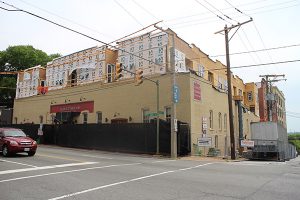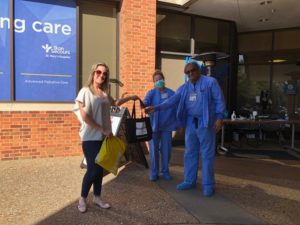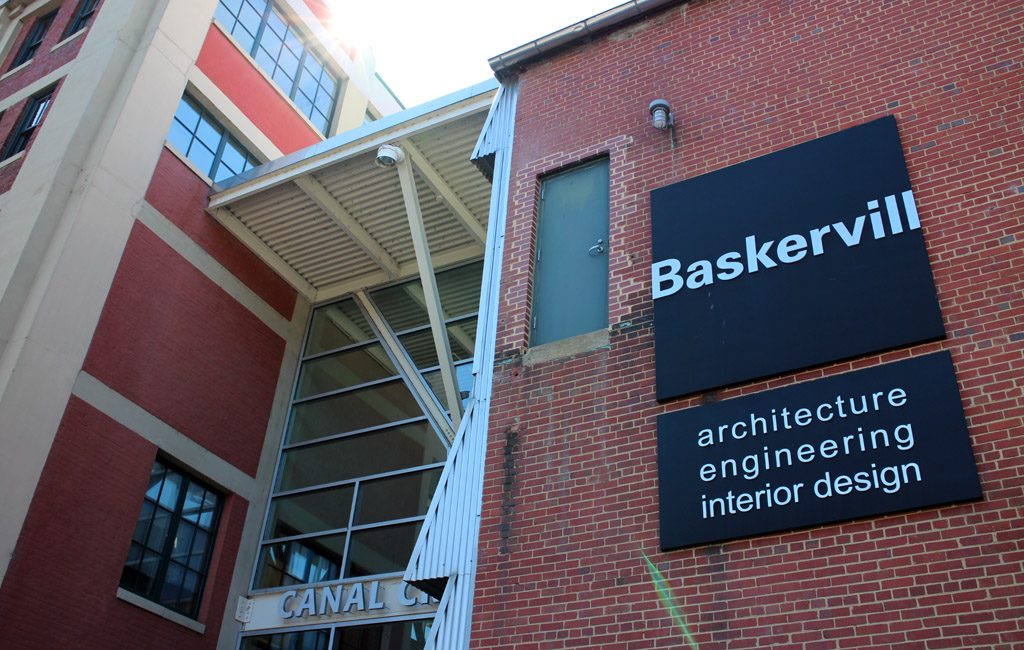Area architecture firms are not immune to the effects of the changing business climate amid the coronavirus pandemic, particularly those that do business in the hard-hit hospitality industry.
Richmond heavyweight Baskervill, whose hospitality portfolio accounted for nearly half of its design output last year, recently laid off 10 percent of its local workforce due primarily to reductions in its workload in that sector, company President Bob Clark said.
Positions affected included 19 in Richmond, as well as four in the firm’s D.C. office and two in Florida.
“Hotels are really taking it hard, and the calls started coming from all our hotel clients saying let’s put this job on hold, let’s put that job on hold,” Clark said. “We’re a small private firm; we’re not a public sector firm with the Amazon and Apple deep pockets.
“It was hard. Those folks are great folks,” Clark said of the employees laid off. “We’re staying in contact with them, and we’re hoping one day we might be able to bring them back on. But this was a reaction to the market we were facing at the time.”
The company is not alone in having to adjust to the market.
Fellow Shockoe Bottom design firm Glavé & Holmes is instituting across-the-board cutbacks in which every employee is working reduced hours with less pay. The partial furloughs are in effect for three months but may be lifted before then, said Lori Garrett, a senior principal with the firm.
While not as hospitality heavy, with the sector representing about 6 percent of its current workload, the 68-person firm made the cuts in light of impacts across its portfolio, the bulk of which focuses on higher education. Nonetheless, Garrett said, the firm’s hospitality studio was hit hardest by the cutbacks.
“That is the market sector that we have seen the most pullback from,” she said. “We have clients that have either cancelled or put projects on hold for the indefinite future, to some that are putting it on hold for a little bit more near term; they want to ride out the next two to three weeks and then re-evaluate. And then we have a couple projects that are in the works that are still going forward.
“We’re just trying to match staff availability with workload, as well as to keep as many of our people employed,” Garrett said. “We’re trying our best to retain them.”
3north, a 25-person firm that also counts hospitality among its focus areas, has thus far avoided layoffs or furloughs, due to much of its workload holding steady, managing principal Jay Hugo said.
“We’ve been fortunate to have some great clients that are pressing on, specifically in the hospitality sector,” Hugo said, referring to their sole active project in that sector, a renovation of The Tides Inn in Irvington, which Hugo said the resort is pushing forward with in hopes of re-opening in time for the summer season.
Hugo said the firm has had candid discussions with staff about salary reductions across the board, with the goal of keeping the team it’s built intact.
“It seems that folks are rallying with that mindset,” he said. “Obviously things are fluid and who knows what’s next, but right now, we’re trying to steer clear of layoff and furlough discussions, and really focus on getting the team through this.”

Glave & Holmes’ Shockoe Bottom headquarters in 2016, when 12 apartments that the firm designed were added above its space. (BizSense file photo)
Ups and downs
Garrett, who leads Glavé and Holmes’ higher ed studio, said the firm has had to adjust to fluctuations in that sector as well, though not always due to pullbacks. In some cases, just the opposite, she said.
“There are some of our higher ed clients that have projects that were about ready to enter construction that are actually going ahead with them early, because students have left their campuses,” Garrett said. “They are in a better position now to move forward with projects that allow them ample time to be completed before students return in August.”
Garrett said the firm’s portfolio diversification has helped offset impacts from individual industries. She said the firm will re-evaluate the three months’ worth of cutbacks after two months, to see if they can end the furloughs early.
Gauging how long such impacts will last is the challenge moving forward, said Baskervill’s Clark, who likewise pointed to the company’s diversified client base.
“A substantial amount of hotel projects have all gone on hold. Fortunately, the other work has stayed pretty steady,” Clark said. “The concern to come now is, depending on the economist you follow, the (national) GDP’s going to drop – some are saying 60 percent a month, some are saying 20-some percent in the next quarter, which would be an incredibly huge drop.
“The unemployment claims are shooting through the roof right now nationally, so there is a recessionary time to come through this thing. How long does that last?” Clark said. “I think most are confident that we’ll be on the upturn by the fourth quarter, but the second quarter into the third quarter may be pretty rough economically for all industries, so that’s the next hurdle on the radar.”
Another challenge facing Baskervill is its pending move to its new office in The James Center, where it’s planning to relocate effective June 1 after 17 years at the Canal Crossing building. He said the firm will need to coordinate its staff, most of whom are working remotely, to come into the office about eight employees at a time to pack up their things in preparation for the move.
“Unless something dramatically wonderful happened to change this, we are assuming right now we will never gather as a full firm again in our current office,” Clark said, adding that the firm likewise will have to wait before it can fill its new space.
“We will likely be in our new office for two weeks before, under current guidance, we ever gather as a whole firm in there again. So it’s quite interesting,” he said.
While the effects of the pandemic have caused such challenges to pile up, Clark said Baskervill has seen some good come out of the circumstances, in the form of a donation from one of its design collaborators in China.

Baskervill principal Patricia Lopez delivers the donated masks to Bon Secours staff at St. Mary’s Hospital. (Baskervill)
Clark said the collaborator, which does renderings for Baskervill, sent the firm 200 medical-grade masks that it said it no longer needed. Baskervill in turn gave the masks to Bon Secours, one of its healthcare clients, prompting the Chinese company to offer more.
“Our Chinese firm goes, ‘We’re going to send you 300 more now,’” Clark said, allowing the firm to donate a total of 500 masks that were dropped off last week to the health system’s St. Mary’s Hospital.
“It was a nice thing going on in the midst of all this craziness,” he said.
Area architecture firms are not immune to the effects of the changing business climate amid the coronavirus pandemic, particularly those that do business in the hard-hit hospitality industry.
Richmond heavyweight Baskervill, whose hospitality portfolio accounted for nearly half of its design output last year, recently laid off 10 percent of its local workforce due primarily to reductions in its workload in that sector, company President Bob Clark said.
Positions affected included 19 in Richmond, as well as four in the firm’s D.C. office and two in Florida.
“Hotels are really taking it hard, and the calls started coming from all our hotel clients saying let’s put this job on hold, let’s put that job on hold,” Clark said. “We’re a small private firm; we’re not a public sector firm with the Amazon and Apple deep pockets.
“It was hard. Those folks are great folks,” Clark said of the employees laid off. “We’re staying in contact with them, and we’re hoping one day we might be able to bring them back on. But this was a reaction to the market we were facing at the time.”
The company is not alone in having to adjust to the market.
Fellow Shockoe Bottom design firm Glavé & Holmes is instituting across-the-board cutbacks in which every employee is working reduced hours with less pay. The partial furloughs are in effect for three months but may be lifted before then, said Lori Garrett, a senior principal with the firm.
While not as hospitality heavy, with the sector representing about 6 percent of its current workload, the 68-person firm made the cuts in light of impacts across its portfolio, the bulk of which focuses on higher education. Nonetheless, Garrett said, the firm’s hospitality studio was hit hardest by the cutbacks.
“That is the market sector that we have seen the most pullback from,” she said. “We have clients that have either cancelled or put projects on hold for the indefinite future, to some that are putting it on hold for a little bit more near term; they want to ride out the next two to three weeks and then re-evaluate. And then we have a couple projects that are in the works that are still going forward.
“We’re just trying to match staff availability with workload, as well as to keep as many of our people employed,” Garrett said. “We’re trying our best to retain them.”
3north, a 25-person firm that also counts hospitality among its focus areas, has thus far avoided layoffs or furloughs, due to much of its workload holding steady, managing principal Jay Hugo said.
“We’ve been fortunate to have some great clients that are pressing on, specifically in the hospitality sector,” Hugo said, referring to their sole active project in that sector, a renovation of The Tides Inn in Irvington, which Hugo said the resort is pushing forward with in hopes of re-opening in time for the summer season.
Hugo said the firm has had candid discussions with staff about salary reductions across the board, with the goal of keeping the team it’s built intact.
“It seems that folks are rallying with that mindset,” he said. “Obviously things are fluid and who knows what’s next, but right now, we’re trying to steer clear of layoff and furlough discussions, and really focus on getting the team through this.”

Glave & Holmes’ Shockoe Bottom headquarters in 2016, when 12 apartments that the firm designed were added above its space. (BizSense file photo)
Ups and downs
Garrett, who leads Glavé and Holmes’ higher ed studio, said the firm has had to adjust to fluctuations in that sector as well, though not always due to pullbacks. In some cases, just the opposite, she said.
“There are some of our higher ed clients that have projects that were about ready to enter construction that are actually going ahead with them early, because students have left their campuses,” Garrett said. “They are in a better position now to move forward with projects that allow them ample time to be completed before students return in August.”
Garrett said the firm’s portfolio diversification has helped offset impacts from individual industries. She said the firm will re-evaluate the three months’ worth of cutbacks after two months, to see if they can end the furloughs early.
Gauging how long such impacts will last is the challenge moving forward, said Baskervill’s Clark, who likewise pointed to the company’s diversified client base.
“A substantial amount of hotel projects have all gone on hold. Fortunately, the other work has stayed pretty steady,” Clark said. “The concern to come now is, depending on the economist you follow, the (national) GDP’s going to drop – some are saying 60 percent a month, some are saying 20-some percent in the next quarter, which would be an incredibly huge drop.
“The unemployment claims are shooting through the roof right now nationally, so there is a recessionary time to come through this thing. How long does that last?” Clark said. “I think most are confident that we’ll be on the upturn by the fourth quarter, but the second quarter into the third quarter may be pretty rough economically for all industries, so that’s the next hurdle on the radar.”
Another challenge facing Baskervill is its pending move to its new office in The James Center, where it’s planning to relocate effective June 1 after 17 years at the Canal Crossing building. He said the firm will need to coordinate its staff, most of whom are working remotely, to come into the office about eight employees at a time to pack up their things in preparation for the move.
“Unless something dramatically wonderful happened to change this, we are assuming right now we will never gather as a full firm again in our current office,” Clark said, adding that the firm likewise will have to wait before it can fill its new space.
“We will likely be in our new office for two weeks before, under current guidance, we ever gather as a whole firm in there again. So it’s quite interesting,” he said.
While the effects of the pandemic have caused such challenges to pile up, Clark said Baskervill has seen some good come out of the circumstances, in the form of a donation from one of its design collaborators in China.

Baskervill principal Patricia Lopez delivers the donated masks to Bon Secours staff at St. Mary’s Hospital. (Baskervill)
Clark said the collaborator, which does renderings for Baskervill, sent the firm 200 medical-grade masks that it said it no longer needed. Baskervill in turn gave the masks to Bon Secours, one of its healthcare clients, prompting the Chinese company to offer more.
“Our Chinese firm goes, ‘We’re going to send you 300 more now,’” Clark said, allowing the firm to donate a total of 500 masks that were dropped off last week to the health system’s St. Mary’s Hospital.
“It was a nice thing going on in the midst of all this craziness,” he said.




